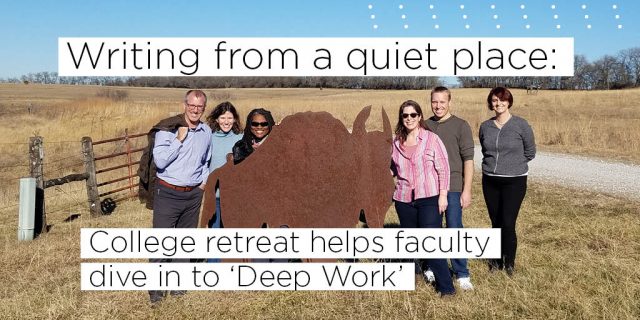
By Tamara Falicov
Two years ago at a College of Liberal Arts and Sciences faculty focus group, one faculty member spoke about her challenges impeding research productivity. In order to complete a journal article under deadline, she stated, she would need to rent a hotel room for two nights out of town to sequester herself in a quiet place. The process of writing, for her, was not a one- or two-hour proposition. It was a matter of setting aside large swaths of time, away from other responsibilities to clear a mental and physical space.
The hotel room idea offered by the faculty member, coupled with on-campus expertise in writing productivity, morphed into a research development opportunity: a two-day writing retreat for faculty offered once a semester.
Faculty apply using a simple grant application, justifying why they need time away to complete a major creative work, grant, article or book. The first iteration was held in Spring 2019. Five selected faculty members arrived at the retreat space at a ranch minutes away from the KU campus, and stayed Friday morning through Saturday afternoon. Selected faculty participants came from different disciplines in the College and many of them were close to submitting their dossier for tenure to associate professor or promotion to full professor.
KU productivity coach Kathleen Ames-Stratton and associate dean for research (arts and humanities) Tamara Falicov host. The participants are trained in productivity skills, including the concept of “Deep Work,” coined by the author Cal Newport. “Deep Work” is a mental state whereby people focus on their cognitively challenging work intently. One perceives as if time stops, becoming completely engrossed in their writing, in a way very similar to what the faculty member was seeking by staying in a hotel room out of town for two days.
Prior to attending, faculty were asked to read Carson Tate’s book “Work Simply” to learn their personal productivity style. At the retreat they were paired with faculty of the same style to serve as accountability partners throughout the process. Each morning, upon meeting, the group discussed their intentions for writing that day, and made longe-range plans for sustainability of their writing and creative work projects.
Along with significant blocks of writing time to dive into the deep work of their project, participants had the opportunity to meet with a writing coach to develop a plan to capitalize on the momentum gained during the retreat and sustain them when returning to their day-to-day responsibilities.

“The writing retreat was a great opportunity for me to have time away from all the various other duties so that I could focus on writing. After the retreat I stayed in contact with one of the other participants and we exchanged updates about our writing and progress,” said Cecile Accilien, in the Department of African & African-American Studies.
Another faculty participant said: “What scholars need sometimes to support our writing is principally time and space. There are no tricks or shortcuts that can replace that, though a beautiful setting and good company also help. I made substantial strides on my book project, and built mutually supportive relationships with my colleagues. It was a pleasure, definitely a highlight of the semester, and I would eagerly sign up to do it again.”
For more information on College writing retreats, please contact Tamara Falicov tfalicov@ku.edu